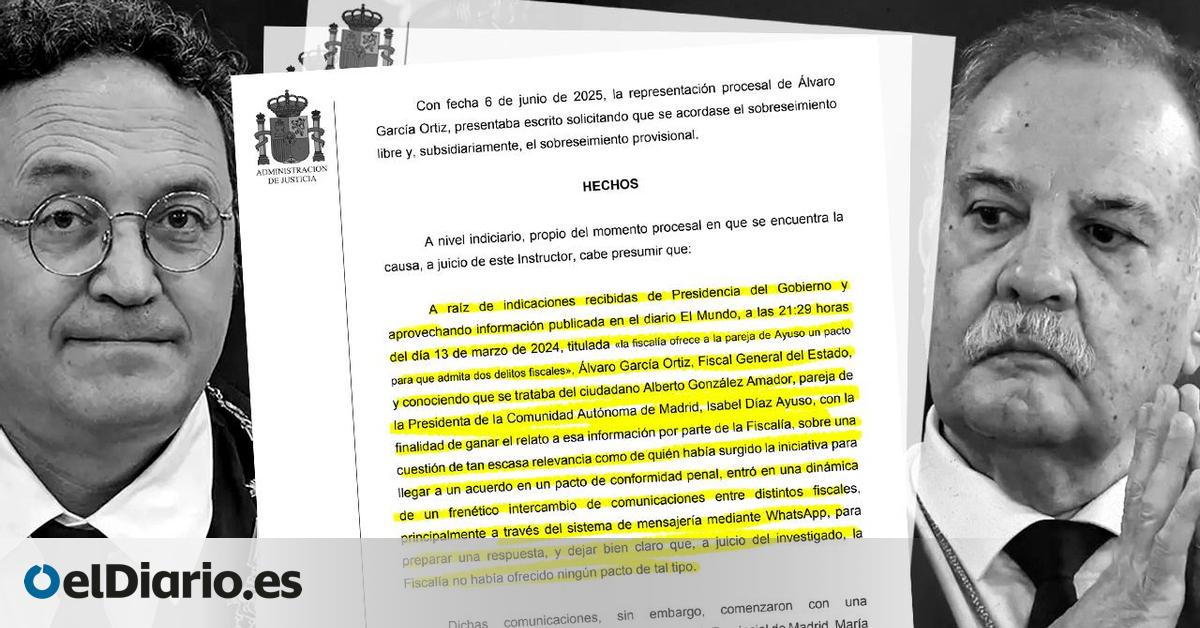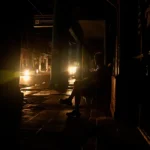
Álvaro García Ortiz will be predictably on the bench accused of filtering an email from Isabel Díaz Ayuso. Judge Ángel Hurtado understands that there is sufficient evidence so that the attorney general and the provincial prosecutor of Madrid, Pilar Rodríguez, are tried for revealing to the press the email with which Alberto González Amador confessed his fiscal fraud of 350,000 euros. A car in which the magistrate of the Supreme Court adds an unprecedented accusation in eight months of investigation: that the State Attorney General perpetrated this filtration following “indications” arrived directly from the Moncloa Palace.
It is the phrase with which the final fact story of Hurtado starts after listening to 22 witnesses and accused, reading half a dozen reports of the Civil Guard and analyzing more than a hundred documents that appear in the case. “Following indications received from the government’s presidency.” Until now, the magistrate had attributed this filtration to García Ortiz’s effort and his team to win “the story” and deny false information about the case. This car, which has the power to condition the development of the trial, goes one step further and adds, without explaining how it comes to that conclusion, that everything was done following Moncloa orders.
The phrase has been enthusiastically for the Popular Party, which with Isabel Díaz Ayuso at the head has been denouncing a “state operation” to harm the Madrid president through the fiscal problems of her partner. “It is time for the State Attorney General and who gave him the indications,” said Alberto Núñez Feijóo while sharing the first page of the car on the social network. Affirmation that other party leaders have developed such as Cuca Gamarra but that does not correspond to any proof gathered throughout the cause. The party has asked today that Sánchez appears in Congress to inform “about the indications received” by García Ortiz.
The magistrate himself launches that political bomb in the first paragraph of his description of the facts but reduces the intensity of that accusation as his text progresses. In the final stretch of the car, the judge recognizes that the “trigger” of that action of the Attorney General – recover the information of the case of Alberto González Amador and the mail with his confession to deny bulos and false news of the case – was “the information published in the newspaper El Mundo” that offered a manipulated version of the facts. All “apart from the indications that could have received from the presidency of the Government”, which in this phase of the car already loses the category of main theory, but remains.
Hurtado’s phrase fully puts Moncloa in the future trial against the attorney general but is not held in any evidence collected over more than half a year of investigation. The magistrate dedicated several weeks of proceedings to discover how the confession of Alberto González Amador arrived at the telephone of Pilar Sánchez Acera – on those subordinate dates of the Chief of Cabinet of Sánchez – on the morning of March 14 and before its full content was published by the media, but the possibility that presidency of the Government had orchestrated the filtration had never been on the table.
That part of the investigators started when Juan Lobato, then leader of the Madrid socialists, went to a notary and consigned the messages he had crossed with Sánchez Acera, then advise in Moncloa and now the leader of the regional PSOE, on the morning of March 14, 2024. That morning Isabel Díaz Ayuso appeared for the first time before the plenary of the assembly after Eldiario was revealed denounced for fiscal fraud and documentary falsehood, but last night a novelty had staggered the foundations of its defense strategy: not only was it not a state conspiracy against it, but its partner had recognized the facts one month earlier.
As the messages contributed by Lobato the Supreme show, Sánchez Acera sent him the confession of González Amador’s lawyer to his WhatsApp at half past eight in the morning. Half an hour before the plural, first means to disseminate the document. Lobato distrusted and preferred to wait for some newspaper to publish it before wielding it in the assembly against Ayuso, as he finally did. Sánchez Acera then told him that this document came because “the media have it” and before the judge he did not specify who sent it, but denied that it was the Prosecutor’s Office.
Hurtado’s theory has always been that this document arrived at Moncloa’s advisor from the Prosecutor’s Office and that both she and others in charge of communication in the PSOE sought their “political use” to attack Ayuso. But it does not provide proof to sustain that theory: there are no messages, calls or emails that sustain even in an indicative manner that Acera received the mail from the Fiscal Ministry.
The magistrate has come to openly accuse the exassora of the presidency of lying in his testimony and of being able to face an accusation of false testimony if he repeats his words in the trial. But so far I had never affirmed, nor slide or suggested, that behind the filtration attributed to García Ortiz there would be an order of Moncloa.
A political bomb at the doors of the trial
Judge Hurtado did not allusion to this possibility when, last January, he rejected impute Sánchez Acera and discarded the possibility of continuing to investigate whether González Amador’s mail had passed or not by the presidency of the Government. According to his theory of that time, he put an end to that part of the investigation, this advisor to Óscar López could not incur a crime of revelation of secrets because he had previously been “filtered, apparently, by the Prosecutor’s Office” and therefore “what was transmitted was not new.”
That branch of the case, Hurtado explained then, served to prop up that the filtration of the mail “presumably comes out of prosecution”, but not to mention the possibility that there was an order of presidency of the Government. A possibility for which he has not asked any of the witnesses related to this part of the case: neither Juan Lobato, nor Pilar Sánchez Acera nor Francesc Vallès, then Secretary of State for Communication.
The judge has never hidden his interest in this branch of the case arising from Lobato’s visit to a notary. “It seems to me a key element for the clarification of the facts,” said the magistrate when the already expolatico went to declare already recognize, among other things, that he had consigned the messages to “cover her backs.” But he has not asked, neither to the Attorney General or the provincial prosecutor of Madrid, if in addition to wanting to win the “story” they were following “indications” of the cabinet closest to Pedro Sánchez.
This possibility has not been suggested by the Central Operating Unit (UCO) of the Civil Guard, author of the key reports of the case. The agents are clear when attributing a “accurate information about the filtration” to Sánchez Acera, as well as a “certain domain” about the publication of the document in the plural shortly after their talk with Lobato on the morning of March 14, but they do not mention the possibility that there are some kind of government guideline behind. Not even Alberto González Amador, in his multiple writings, has gone beyond explaining that the Government and the PSOE used that information from the Prosecutor’s Office to attack Ayuso.
Neither Álvaro García Ortiz nor Pilar Rodríguez have had to face, so far, to the accusation of following orders from the presidency of the Government within the framework of this cause, which conditions the weight that this statement of Hurtado may have in the future trial. Nor is there any charge of Poncloa accused and the judge has never put in advance proceedings to discover if the department directed by Oscar López was the one who directed the movements to filter that information. But the political earthquake of this unpublished phrase of Hurtado has already begun and the Popular Party, in addition to the public statements of its leaders, has requested that Pedro Sánchez appear before the Plenary of Congress for whom he gave “indications” to the Attorney General.
“Full trust” in García Ortiz
The government did not take long to close ranks with the State Attorney General after processing. From the Executive they already took for weeks that this point of the cause would come despite the arguments with which, in his opinion, the Supreme for the Archive says. So the ultranza defense messages of the figure of García Ortiz were already quite rehearsed.
“Of course, the government, between prosecutors and fraudsters confessed, is always with prosecutors who pursue the crime,” reacted the Minister of Justice, Félix Bolaños, during an act in which he coincided precisely with the Attorney General. Regarding the novelty introduced by the Supreme Judge in his car, with the attribution to the Moncloa of instructions to the Prosecutor’s Office, Bolaños says that such an extreme “never happened” and regrets that the high court makes that statement “without any probative base.”
In the Moncloa, where they admit that they gave “dense” the processing, they ensure that this new step in the procedure does not change an apex its support for García Ortiz. “Our confidence in the attorney general is full, and also in which process will end up emerging the truth, which is that it did nothing reprehensible,” says sources from the Pedro Sánchez team, which only slide privately and veiled a reproach to the Supreme Court that Minister Oscar Puente did make public on Monday.
“The real opposition of this country has to leave every Monday to fix the disagreements of Feijóo. The disaster of its demonstration of yesterday must have been fatal,” bridge attacked a bridge on their social networks attributing a political purpose to the performance of the high court.
Source: www.eldiario.es

